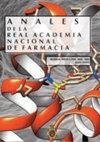拿破仑时期意大利共和国和拿破仑时期意大利王国药剂师的宣誓和发证方式
Q Pharmacology, Toxicology and Pharmaceutics
Anales De La Real Academia Nacional De Farmacia
Pub Date : 2023-09-30
DOI:10.53519/analesranf.2023.89.03.04
引用次数: 0
摘要
根据拿破仑时期意大利共和国(1802-1805 年)和拿破仑时期意大利王国(1805-1814 年)的改革,本研究选取了一些未发表的文件,介绍药剂学学位课程的完成情况及其相应的资格考试。1802 年 9 月 4 日的《公共教育法》和 1803 年的《国立大学学习和纪律计划》规定,药剂师必须在一所国立大学学习三年,才能获得学术学位。这些改革还规定,药剂师毕业后还需通过考试才能自由从业。第一份引人注目的文件是药剂学专业学生在获得学位时的誓词。誓词非常详细,准确地描述了意大利新政府对药剂师的期望以及他们必须履行的所有职责。在中央医疗、外科和制药办公室(Ufficio Centrale Medico、Chirurgico、Farmaceutico)--当时负责卫生专业人员资格认证的机构--的文件中,有办公室条例,其中包括有关药剂师资格考试及其公告的所有规则。此外,还有药剂师在期末考试结束时朗读的誓词。该誓词比大学毕业时的誓词更加简洁,在这种情况下,它与内科医生和外科医生的誓词相同。在这些文件中,最引人注目的是授予那些以优异成绩通过考试的药剂师的特殊资格:可以生产并向其他药剂师出售大量化学制药化合物。本文章由计算机程序翻译,如有差异,请以英文原文为准。
Formulae of oath and licensing of pharmacists during the Napoleonic Italian Republic and the Napoleonic Kingdom of Italy
This study presents selected unpublished documents that concern the completion of the pharmacy degree programme and its corresponding qualifying exam, in accordance with the reforms of the Napoleonic Italian Republic (1802-1805) and the Napoleonic Kingdom of Italy (1805-1814). The Law on Public Education of 4 September 1802 and the Study and Discipline Plans for National Universities of 1803 stated that pharmacists had to study for three years at one of the national universities in order to obtain an academic degree. These reforms also declared that, after graduating, a further exam was required before pharmacists could freely exercise their profession. The first remarkable document is the one containing the oath taken by pharmacy students upon obtaining their academic degree. The oath is very detailed and accurately describes the expectations that the new Italian Government placed on pharmacists, as well as all the duties that they had to fulfil. Among the documents of the Ufficio Centrale Medico, Chirurgico, Farmaceutico (Central Medical, Surgical and Pharmaceutical Office) – the body that at the time was responsible for qualifying health professionals – there are the Office regulations, with all the rules concerning the pharmacists’ qualifying exam and their proclamation. There is also the oath formula that pharmacists read aloud at the end of their final exam. This oath was more concise than the oath taken at the end of university studies and, in this case, it was the same as the one taken by physicians and surgeons. What is also remarkable in these documents is the special qualification that was granted to those most deserving pharmacists who passed the exam with excellent marks: the possibility of producing and selling large quantities of chemical-pharmaceutical compounds to other pharmacists.
求助全文
通过发布文献求助,成功后即可免费获取论文全文。
去求助
来源期刊

Anales De La Real Academia Nacional De Farmacia
Pharmacology-
CiteScore
0.13
自引率
0.00%
发文量
7
期刊介绍:
The Anales de la Real Academia Nacional de Farmacia� embraces all aspects of pharmaceutical sciences and is a quarterly journal that publishes basic and applied research on pharmaceutical sciences and related areas. It is a medium for reporting selected original and significant contributions to new pharmaceutical knowledge.
 求助内容:
求助内容: 应助结果提醒方式:
应助结果提醒方式:


